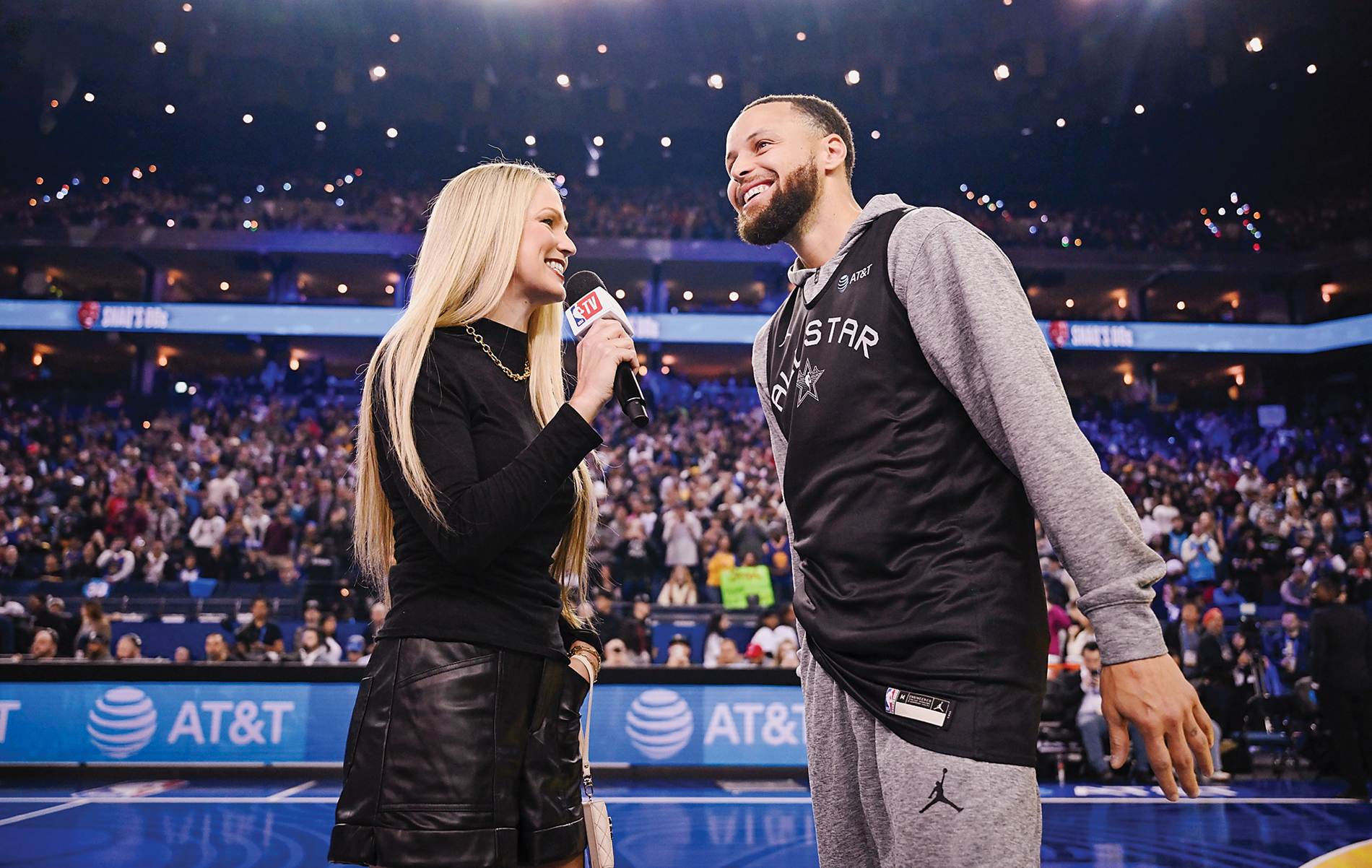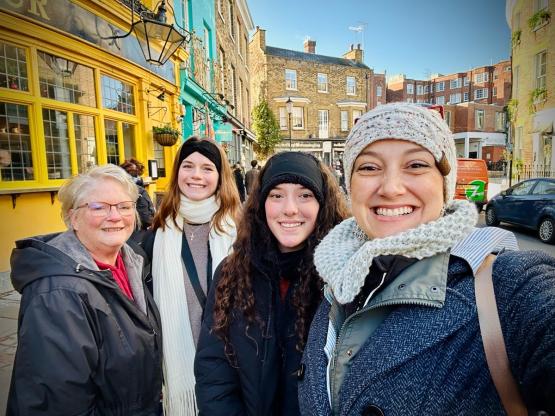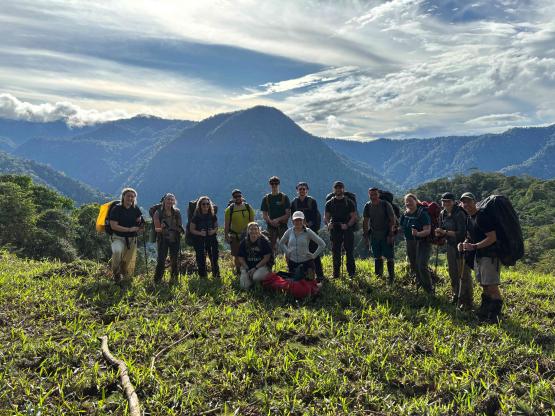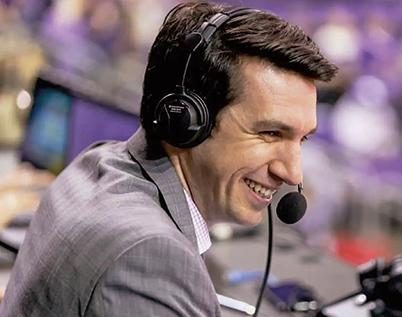
You may know Allie LaForce, BSJ ’11, as TNT’s lead NBA reporter, CBS’ March Madness color analyst or former co-host of CBS’ Lead Off with Doug Gottlieb. But before she became a household name in national sports broadcasting, LaForce lent her razor-sharp commentary to OHIO Athletics.
“[Ohio University] allowed me to walk-on the [women’s varsity] basketball team, had a great journalism program, and that was that,” she says of her decision to enroll here. “Turns out, it was the best thing to ever happen to me. The hands-on journalism experiences were next level. I was learning first-hand out in the field from the moment I stepped foot on campus.”
For LaForce and others, the E.W. Scripps School of Journalism’s sports broadcast training is a game changer. Jordan Boze, assistant athletics director of broadcast and video services, may technically oversee all OHIO Athletics and Ohio Bobcats Studios Productions—which stream through ESPN+ and YouTube—but the students run the show.
With few exceptions—such as some nationally televised football and basketball games—all sports broadcasts are entirely student-led and -operated, from videography and graphics to on-air reporting and directing.
“A person in my position typically leads broadcasts as the official producer or director … but I really look at myself as a steward,” explains Boze, who describes OHIO’s sports broadcasting as one of the “truest” student-led programs in the country for that reason. He joined the University to lead the program in 2022.
“Since then, we’ve done over 350 productions, involving at least 140 students,” he says, for what he estimates to be “just shy of 25,000 hours” of total experiential learning time.
OHIO’s tradition of putting technical and creative decision-making directly into students’ hands has produced a decades-strong, self-perpetuating culture of passion, broadcasting excellence and success.
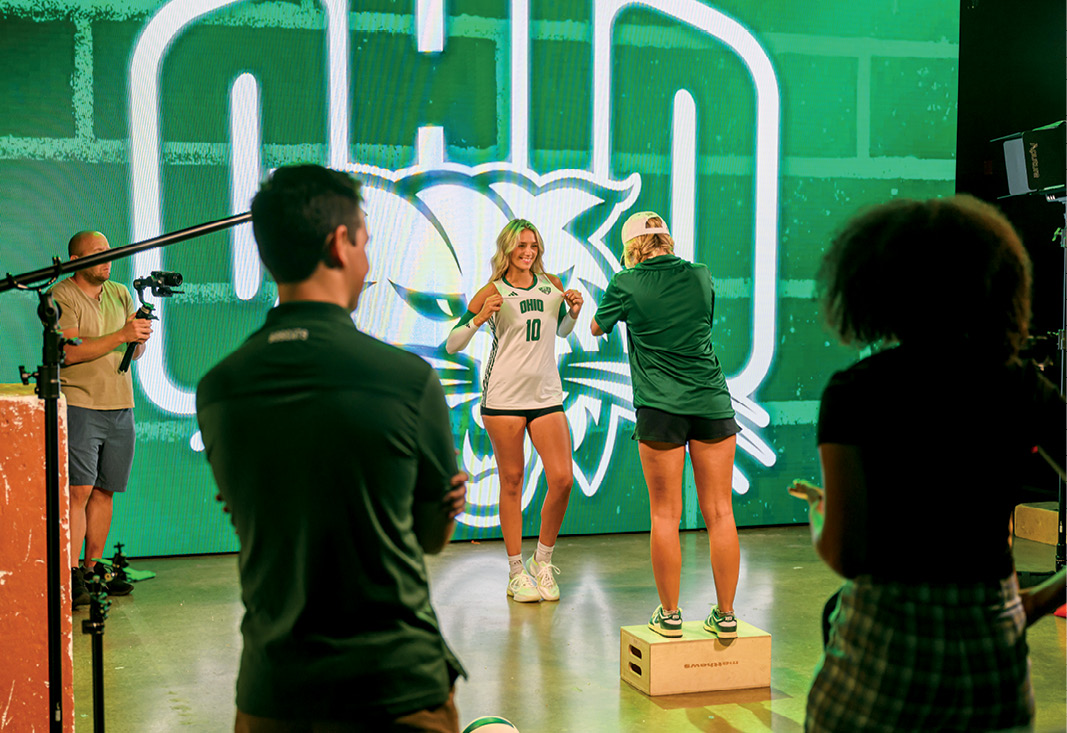
Sports broadcasting students, in collaboration with staff from University Communications and Marketing, shoot promotional materials for the OHIO women’s volleyball team. Photo: Ben Wirtz Siegel, BSVC ’02
LaForce praises the support she received from both fellow students and active alumni during her time on campus. That includes Tony Castricone, BSJ ’05, now the “Voice of the Washington Huskies” at the University of Washington, who continued commuting to Athens to do play-by-play reporting for women’s varsity basketball—alongside LaForce’s color commentary—after landing his first full-time broadcast job at WBNS Radio in Columbus.
“[Castricone] actually tricked me once,” LaForce recalls. “He called in sick two hours before the game and told me I needed to set up the broadcast station and equipment—then do both color analysis and play-by-play. I was freaking out! He knew I needed to be forced to do it.”
This combination of challenge and camaraderie echoes the experiences of current OHIO student sports broadcasters. And while front-of-camera positions like LaForce’s and Castricone’s may be eye-catching, students gain meaningful experience behind the camera and in the operating booth, too.
“From my very first day, [Boze] encouraged us to learn from each other and grow together as a group,” says Sydney Holl, a fourth-year media arts production major from Akron whose work with ESPN+ includes a specialization in replay. “The more we grow into it, the more we get to start teaching others, which helps us form those bonds as a team.”
These broadcasters get their start in Boze’s Introduction to Sports Production course, which involves just one traditional class a week, plus a “lab” component working home sporting events for ESPN+. Boze maintains a spreadsheet where students can sign up for positions in camera, replay, graphics and more.
After completing the course, interested students can apply to continue supporting campus sports broadcasting on the OHIO Athletics payroll in technical, production, directing and on-air talent roles. These paid students spend long weekends setting up, operating and tearing down equipment; editing graphics; and calling game plays live on-air.
That’s when Bobcat broadcasters really hone their leadership skills and build both professional networks and lasting friendships. Colin Bacon, a fourth-year music production major from West Chester Township, Ohio, who minors in sports management and marketing, recently moved into his own mentorship role.
“It’s cool to see the evolution: I started off learning everything,” he says, “and now I’m learning even more, because I’m teaching it to others.”
Bobcat broadcasters also learn to trust their own professional instincts and test creative choices. “There are times in the field where someone might have an interesting new camera angle or a new graphic to throw in,” says Bacon, who specializes in video production. “We get to innovate our own ideas and see what happens.”
This culture builds collaboration over cutthroat competitiveness—though there’s still plenty of friendly internal competition—and always, always, a commitment to excellence.
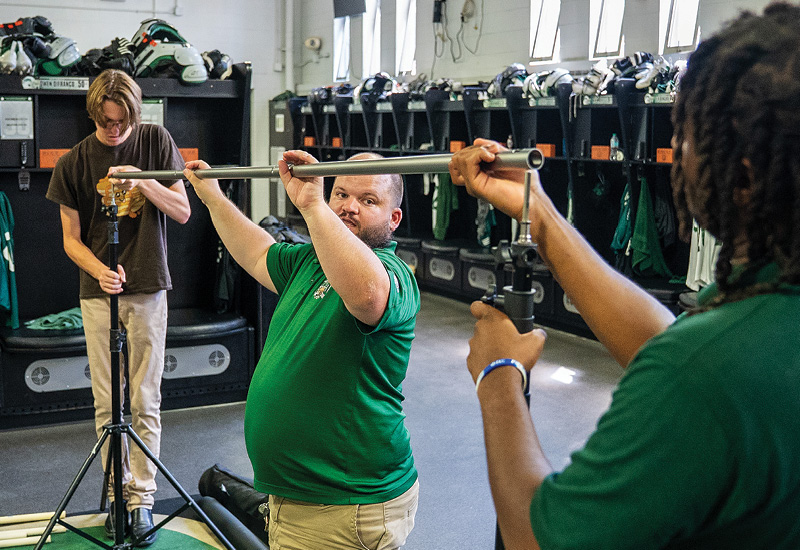
Jordan Boze, assistant athletics director of broadcast and video services for OHIO Athletics, helps students set up equipment for a promotional shoot in the Bobcats football locker room. Photo by: Christofer Smith, BSC ’09
“We’ve been praised by our conference counterparts and ESPN representatives for the quality of work that we do,” Boze says, noting his students’ fierce drive to learn from mistakes and level up. “After every production, we meet as a crew and debrief on what we can do better. Often, I won’t have much to say that the students haven’t said already.”
Above all, these hands-on opportunities give students the chance to gain invaluable skills, connections and insight into what they’re capable of—all while doing something they love.
Castricone can certainly attest to that. He refers to his Bobcat broadcasting days as some of the best experiences not just of college, but of his whole life.
“Those were the beginning stages of pursuing the dream, when you’re doing it purely for love of the game, not because you’ve got to put food on the table or anything else,” he says. “Now I’m happily married to this career—but when I was first falling in love with it, that was at Ohio University.”
If you ask Boze, that love—of both sports and broadcasting—is the “secret sauce” behind the quality and popularity of OHIO’s sports broadcasting program. “If you give students challenges, leadership opportunities, and a clear path toward something they’re deeply passionate about,” he notes, “they’re going to succeed.”
Feature photo: OHIO alumna Allie LaForce interviews Golden State Warriors point guard Stephen Curry for TNT after the 2025 NBA All-Star game. Photo by Brandon Vallance / TNT Sports
Beyond the Classroom

Huskies. Photo by: Scott Eklund / Red Box Pictures
Student broadcasters can take advantage of extracurricular opportunities through WOUB Public Media, esports broadcasting and the community-owned Southern Ohio Copperheads summer baseball team.
During Tony Castricone’s first weekend at OHIO, he spoke to a fellow freshman who casually mentioned covering Castricone’s former high school in a football game on WOUB.
“I thought, ‘There’s no way that guy is doing that and I’m not,’” recalls Castricone, BSJ ’05. “So, I dived in and discovered WOUB Radio and TV, The Post, Gridiron Glory—all these resources.”
Gridiron Glory is a student-produced, Emmy Award-winning, weekly WOUB show that highlights high school football in Southeast Ohio. The public media station also runs a similar weekly show for high school basketball called Hardwood Heroes and airs student coverage of MAC Championships and other special events.
Castricone recalls recruiting friend Matt Crumpton, BSED ’04, to write what he calls “the southeastern Ohio high school football version” of CBS’ March Madness song, “One Shining Moment.” For more than 12 years, producers of Gridiron Glory played their original song of the same name over an annual video montage of regional high school football highlights.
“We stayed up all night producing and editing the season finale track—three and a half minutes of the best highlights of the year—to that song,” Castricone says. “When we got the final mixdown, the executive producer and I locked eyes, like, ‘This is awesome.’”
“Experiences like that are more than fond memories,” he adds. “They really help you push the limits of what’s possible.”


